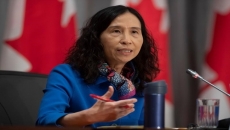The cruise-ship season in Canada is all but sunk as Ottawa extends its ban on large ships in Canadian waters until the end of October in an attempt to contain COVID-19.
Transport Minister Marc Garneau said Thursday passenger ships with overnight accommodations for more than 100 people — including both passengers and crew — can't operate in Canadian waters until at least Oct. 31.
The move extends and expands an order issued in mid-March that barred ships with more than 500 passengers from Canadian waters until July.
Ships with more than 12 passengers can't go to the Arctic until at least Oct. 31, for fear that one might carry COVID-19 to a remote northern community.
Other than that, after July 1, provincial and regional health officials will decide when and where smaller vessels can operate.
"Keeping Canadians and transportation workers safe continues to be my top priority during the COVID-19 pandemic," Garneau said.
Garneau said he also understands this will create a significant economic hardship for Canada's tourism industry. He indicated the federal tourism department is working on a plan to help.
Last year 140 cruise ships brought more than two million visitors to Canadian ports. A 2016 study found the cruise industry was large and growing, contributing more than $3 billion to Canada's economy, including nearly $1.4 billion in direct spending by cruise lines and their passengers. More than 23,000 Canadians were directly or indirectly employed because of cruise ships.
British Columbia, Quebec and the Atlantic provinces benefit the most.
However cruise ships were one of the first- and worst-hit sectors from COVID-19 with hundreds of passengers falling ill on ships as they sailed in various parts of the world. Transport Canada monitored hundreds of ships with Canadians on board as they battled outbreaks, or weren't allowed to dock in planned ports as countries closed to foreign tourists to keep COVID-19 out.
Several hundred Canadians were flown back to Canada and quarantined in Trenton, Ont., and Cornwall, Ont. after disembarking ships with outbreaks on them that docked in Japan and California. At least a dozen passengers from the Grand Princess cruise ship were diagnosed with COVID-19 after being quarantined in Trenton. One Canadian passenger who had been on board the Diamond Princess died in Japan in March after being hospitalized with COVID-19.






